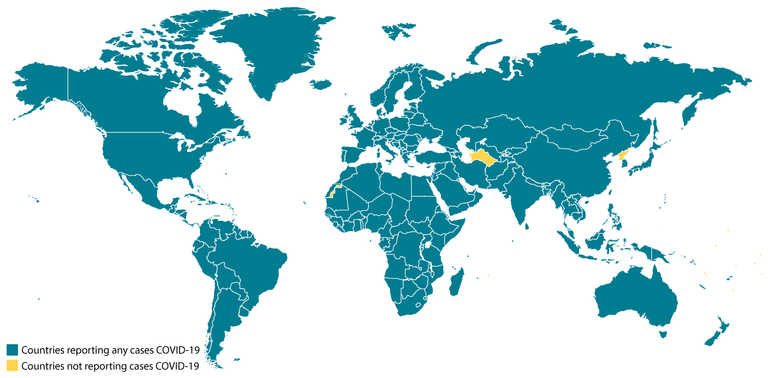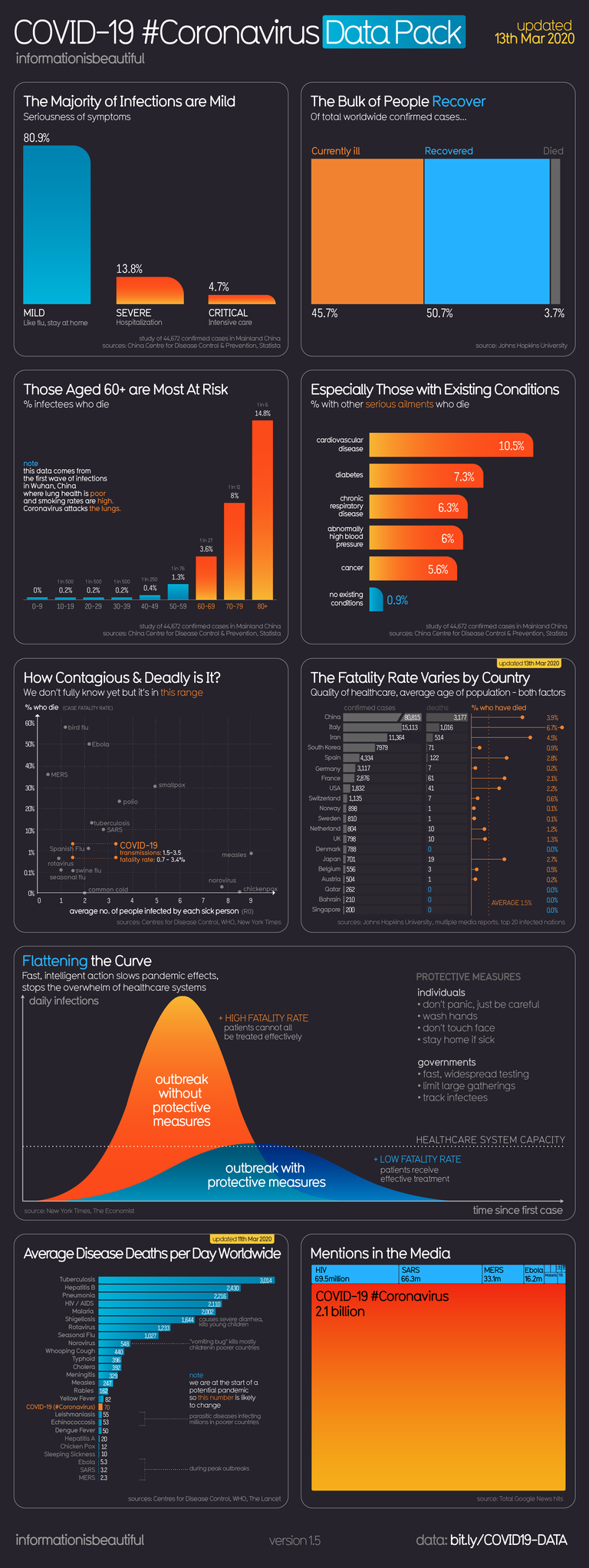Updated 3/18/20.
I am renaming the new coronavirus SARS-CoV-2, to MIHV (Media-induced-hysteria Virus) because of the way the media has sensationalized it to the point that the reaction from the public is excessive. :) This disease is called 2019-nCoV, more commonly known as Coronavirus Disease 2019 (COVID-19).
Remember, MIHV is my sarcastic term for the virus. ;) Stop over-reacting to the media hype, folks. You're creating additional problems with your panic-buying.
The media has ripened the situation to the point that people are stockpiling food, cleaning and health supplies, school districts are talking about or are already enacting shutdowns and online education, nursing homes are restricting or stopping visits from family and friends, and businesses are enacting plans to mitigate problems. For example:
- I got an email from our school district saying that the governor had declared a mandatory shut-down of school, which is going to prove to be a major problem for many families and daycare centers, let alone kids who rely on school for their only source of proper nutrition and care.
- I also got an email from businesses, including the nearest grocery store, restaurants, and others detailing what they're doing to help, including strategic planning of supplies that people might deem necessary such that a run on supplies won't result in some people having too much and others not enough (i.e. they're actually limiting how much of these things a buyer can purchase at once).
- An airline contacted me by email in regard to an upcoming flight, asking that when it's near the date I should contact them about why I'm going so they can prioritize. I may have to reschedule this short trip to June.
- And, I got a call from my mom's nursing home saying that there will be no visitors allowed for the next few weeks.
I spoke to an EMT today who agrees with my assessment that the reaction to MIHV is way out of proportion with what information he's getting from his superiors and what's coming out of the CDC and WHO. People are panicking and calling 911 saying they think they have MIHV, which means that every EMT has to enact full protocols for a viral infection even in cases where the caller has a history of similar calls prior to 1/6/20, or even when they have made calls from before the emergence of MIHV for non-viral conditions with some of MIHV's symptoms (e.g. COPD, asthma, etc).
While it is admirable that businesses are taking actions that anticipate making sure everyone gets what they need, the overall effect the media hype is having on people is negative. We need the media to report accurately and keep the level of reporting to an appropriate level instead of always seeking higher ratings at the expense of the public.

Facts

Map of Confirmed Cases. For some reason this map isn't showing the updates here even though I'm linking directly to the actively updated map, so please visit:
This is a controllable pandemic. What's that mean? If everyone does everything right, we can stop it from spreading further.
- "A widespread endemic disease that is stable in terms of how many people are getting sick from it is not a pandemic." 2 good examples of this are the common cold and seasonal flu. Both are global but don't fit the criteria for a pandemic otherwise.
Unfortunately, the virus can be transmitted by people who are asymptomatic (not yet showing symptoms of the virus), so this has made it much more difficult to contain the virus and has resulted in massive shutdowns worldwide in response.
The death rate of MIHV as of today's (3/12/20) WHO report is .03688983 (3.7%), based on confirmed cases globally of 125,048 with 4,613 deaths. The hardest-hit countries are China (%, 80,981 cases, 3,173 deaths), Italy (1.6%, 12,462 cases, 196 deaths, and it spread very fast), and Iran (0.7%, 9,000 cases, 63 deaths). There are other countries with higher death rates but the overall number of cases is low.
As with MERS and SARS, MIHV affects the lungs and people with a bad infection may end up being on a respirator or developing secondary infections like pneumonia.
SARS infected fewer people, but killed more of them.
MERS killed about 30-40% of those infected, but also infected fewer.
At this time, the area with the greatest problems in terms of cases and spread is Europe.
MIHV can survive in all climates because it is inside of your body.
It can infect people of all ages.
There is no evidence that garlic, saline nasal sprays and other traditional methods will help against MIHV.
As with all viruses, antibiotics do NOT work.
If you have a fever, cough AND difficulty breathing, seek medical help early.
- Unlike the falsely-named "Spanish Flu" (1918 H1N1) of WWI (no one's sure where it started, but it definitely wasn't Spain), which spread very easily and infected an estimated 1/3 of the world's population and killed 10% of them, MIHV only kills about 3%.
- Also unlike 1918 H1N1, which hit the healthiest people the hardest, MIHV tends to mostly kill the elderly and those with weak/compromised immune systems, as well as those with pre-existing conditions that weaken them, like heart disease, diabetes and respiratory disease.
- The media isn't covering it up as happened with Spanish Flu (this was due to WWI and duress by various governments was applied to the media to cover up the pandemic), so we know a lot more about it. As a result, efforts to stymy the disease can be enacted much faster.
- Also unlike the Spanish Flu, the death rate is about 1/3 of 1918 H1N1.
COVID-19's death rate is nothing compared to the overall toll by influenza. Each year, the various strains of flu (including seasonal flu) infect millions and kills hundreds of thousands globally, although the mortality rate due to flu has steadily dropped since 1900. This is probably due to improvements in medical care, especially of secondary infections after catching the flu.

- Flu shots don't protect you against all strains of the flu, just the one that experts are most concerned about at the time.
- Influenza H5N1 (avian bird flu) has a mortality rate of ~60%.
So why all the noise about a disease that isn't that bad, you ask? Quite simple: if this virus mutates, it could be much more deadly (or less). The initial 1918 H1N1 was bad but the 2nd wave was far worse, and the last wave of it (this was all during WWI) was not as bad. Some reports suggest that 70% (or more) of people will get it, although most won't even realize it.
What to Do to Reduce Your Risk
I suggest going to the WHO's Coronavirus disease (COVID-19) advice for the public page. There is a lot of info in text, graphical and video form, including how to reduce your risk, how to wear a mask, symptoms, and myths.
You can reduce your chances of being infected or spreading COVID-19 by taking some simple precautions:
From the WHO's FAQ page:
Regularly and thoroughly clean your hands with an alcohol-based hand rub or wash them with soap and water.
Why? Washing your hands with soap and water or using alcohol-based hand rub kills viruses that may be on your hands.
Maintain at least 1 metre (3 feet) distance between yourself and anyone who is coughing or sneezing.
Why? When someone coughs or sneezes they spray small liquid droplets from their nose or mouth which may contain virus. If you are too close, you can breathe in the droplets, including the COVID-19 virus if the person coughing has the disease.
Avoid touching eyes, nose and mouth.
Why? Hands touch many surfaces and can pick up viruses. Once contaminated, hands can transfer the virus to your eyes, nose or mouth. From there, the virus can enter your body and can make you sick.
Make sure you, and the people around you, follow good respiratory hygiene. This means covering your mouth and nose with your bent elbow or tissue when you cough or sneeze. Then dispose of the used tissue immediately.
Why? Droplets spread virus. By following good respiratory hygiene you protect the people around you from viruses such as cold, flu and COVID-19.
Stay home if you feel unwell. If you have a fever, cough and difficulty breathing, seek medical attention and call in advance. Follow the directions of your local health authority.
Why? National and local authorities will have the most up to date information on the situation in your area. Calling in advance will allow your health care provider to quickly direct you to the right health facility. This will also protect you and help prevent spread of viruses and other infections.
Keep up to date on the latest COVID-19 hotspots (cities or local areas where COVID-19 is spreading widely). If possible, avoid traveling to places – especially if you are an older person or have diabetes, heart or lung disease.
Why? You have a higher chance of catching COVID-19 in one of these areas.



Who's at Risk
You're more likely to die of diabetes, heart disease, respiratory disease (e.g. COPD, emphysema) and other chronic illnesses. If you've already got an illness such as the flu or pneumonia, your auto-immune system is depressed (e.g. HIV/AIDS, cancer treatment patients), the very old, babies and toddlers, medical professionals, smokers and those working/living where there is a lot of air pollution are also considered high-risk. If you've got more than one of these risk factors, then you are even worse off. Take extra precautions, call in to (don't visit if you don't have to because that's a high risk place to go) your medical professional on what you should be doing to stay safe.
Sources
The World Health Organization: the most recent report from the WHO on MIHV is here. The reports are produced daily and the newest is at the top.
The WHO's FAQs about COVID-19
The US CDC
NIMH: Trends in Recorded Influenza Mortality: United States, 1900–2004
Information Is Beautiful: CoViD-19
Responding to the Coronavirus Outbreak by Chris Wade, PhD, MPH
So sad to hear this news
Which part makes you sad?
Please don't spam me with your religious nonsense.